- Home
- Richard Flanagan
The Narrow Road to the Deep North Page 10
The Narrow Road to the Deep North Read online
Page 10
There is nothing to spare. It can’t be helped.
Nakamura knew he had been wrong to raise this matter, but was grateful that Colonel Kota seemed understanding. He read the second order. The deadline for the completion of the railway had been brought forward from December to October. Nakamura was overcome with despair. His task was now impossible.
I know you can make it possible, Colonel Kota said.
It’s no longer April, Nakamura said in what he hoped would be understood as an oblique reference to when headquarters had approved the final plans. It’s August.
Colonel Kota’s eyes remained fixed on Nakamura’s.
We will redouble our efforts, a chastened Nakamura finally said.
I cannot lie to you, Colonel Kota said. I very much doubt there will be a corresponding increase in either machinery or tools. Maybe more coolies. But even that I can’t say. We have over a quarter of a million coolies and sixty thousand prisoners working on this railway. I know the English and Australians are lazy. I know they complain they are too tired or too hungry to work. That they take one small spadeful and stop for a rest. One blow of the hammer, then they halt. That they complain about insubstantial matters such as being slapped. If a Japanese soldier neglects his work he expects to be beaten. What gives cowards the right not to be slapped? The Burmese and Chinese coolies that are sent here keep running away or dying. The Tamils, thankfully, have too far to run back to Malaya, but now they are dying everywhere from cholera, and even with the thousands more now arriving there is still not enough manpower. I don’t know. None of it can be helped.
Nakamura returned to reading the typed letter. The third order was that one hundred prisoners were to be seconded from his camp for work at a camp near Three Pagoda Pass, some one hundred and fifty kilometres to the north on the Burmese border.
I don’t have one hundred prisoners to spare, thought Nakamura. I need another thousand prisoners to complete this section in the time I have been given, not lose even more. He looked up at Colonel Kota.
The hundred men are to march there?
There is no other way in the monsoon. That can’t be helped either.
Nakamura knew many would die trying to get there. Perhaps most. But the railway demanded it, the Emperor had ordered the railway, and this was the way it had been decided that the railway would be made. And he could see that, in reality—this reality of dreams and nightmares that he had to live in every day—there was no other way for the railway to be built. Still he persisted.
Understand me, Nakamura said. My problem is practical. With no tools, and fewer men every day, how do I build the railway?
Even if most die of exhaustion you are to complete the work, Colonel Kota said, shrugging his shoulders. Even if everybody dies.
And Nakamura could see that, in this sacrifice too, there was no other way for the Emperor’s wishes to be realised. What was a prisoner of war anyway? Less than a man, just material to be used to make the railway, like the teak sleepers and steel rails and dog spikes. If he, a Japanese officer, allowed himself to be captured, he would be executed on his ultimate return to the home islands anyway.
Until two months ago I was in New Guinea, Colonel Kota said. Bougainville. Heaven is Java, they say, hell is Burma, but no one comes back from New Guinea.
The colonel smiled, and the sags of his face rose and fell, reminding Nakamura of a terraced hillside.
I’m the proof that old soldiers’ sayings are not always true. But it is very harsh there. The American air power is incredible. Day after day we were pounded by their Lockheeds. Day and night, bombed and strafed. We would be given a week’s rations and expected to fight for a month. If we only had salt and matches in the combat area, we could have coped with anything. But I tell you, what of the Americans and Australians? They can boast only of their matériel power, their machines, their technology. Wait and see! We will wage a war of annihilation. Every officer and man in our army there is churning with the desire to massacre all the Americans and Australians. And we will win, because our spirit will endure when theirs crumbles.
And as the colonel talked, his terraced face seemed to Nakamura to hold within it so much of the ancient wisdom of Japan, of all that Nakamura found good and best in his country, in his own life. Nakamura understood that the colonel, with his gentle voice, was telling him something more than this story: that he was saying that no matter what adversity, no matter what lack of tools and manpower Nakamura might have to put up with, he would endure, the railway would be built, the war would be won, and all this would be because of the Japanese spirit.
But what that spirit was, what it precisely meant, Nakamura would have had difficulty saying. It was good and it was pure, and it was for him a more real force than the thorny bamboo and teak, the rain and mud and rocks and sleepers and steel rails they worked with each day. It had somehow become the essence of him, and yet it was a thing beyond words. And to explain what he was feeling, Nakamura found himself telling a story.
Last night I was talking with an Australian doctor, he said. The doctor had wanted to know why Japan had started the war. And I had explained the nobility of universal brotherhood that was our guiding idea. I mentioned our motto, The Whole World Under One Roof. But I don’t think it came across. And so I said how, in short, it was now Asia for the Asians, with Japan the leader of the Asian bloc. I told him how we were liberating Asia from European colonisation. It was very hard. He kept on about freedom.
In truth Nakamura had had no idea what the Australian had been on about. The words, yes, but the ideas made no sense at all.
Freedom? Colonel Kota said.
They laughed.
Freedom, Nakamura said, and they both chuckled again.
Nakamura’s own thoughts were a jungle unknown and perhaps unknowable to him. Besides, he didn’t care about his own thoughts. He cared about being certain, sure. Kota’s words were like shabu for his sick mind. Nakamura cared about the railway, honour, the Emperor, Japan, and he had a sense of himself as a good and honourable officer. But still he tried to fathom the confusion he felt.
I remember early on, when the prisoners still had concerts, and one night I was watching. The jungle, the fire, the men singing their song, the ‘Waltzing Matilda’. It made me feel sentimental. Even sympathetic. It was hard not to feel moved.
But the railway, Colonel Kota said, is no less a battlefield than the front line in Burma.
Exactly, Nakamura said. One cannot distinguish between human and non-human acts. One cannot point, one cannot say this man here is a man and that man there is a devil.
It is true, Colonel Kota said. This is a war, and war is beyond such things. And the Siam–Burma railway is for a military purpose—but that’s not the larger point. It is that this railway is the great epoch-making construction of our century. Without European machinery, within a time considered extraordinary, we will build what the Europeans said it was not possible to build over many years. This railway is the moment when we and our outlook become the new drivers of world progress.
They drank some more sour tea, and Colonel Kota grew wistful about not being at the front, able to die for the Emperor. They cursed the jungle, the rain, Siam. Nakamura spoke of how hard it was to keep driving the Australians out to work, and how if they were only a little more accepting of the great role destiny had given them, he wouldn’t have to drive them so pitilessly. It wasn’t in his nature to be so harsh. But in the face of the Australians’ intransigence, he had to be.
They have no spirit, Colonel Kota said. That’s what I saw in New Guinea. You charge them, they scatter like cockroaches.
If they had spirit, Nakamura said, they would have chosen death rather than the shame of being a prisoner.
I remember when I first went to Manchukuo, fresh from officer school, Colonel Kota said, clenching his hand as if around a handle or grip. A second lieutenant, very green. Five years ago. How long ago it seems. We had to undertake special field training exercises to prepare
us for combat. One day we were taken to a prison for our trial of courage. The Chinese prisoners hadn’t been fed for days. They were so scrawny. They were bound and blindfolded and made to kneel in front of a large pit. The lieutenant in charge unsheathed his sword. He scooped some water with his hand from a bucket and poured it over both sides of the blade. I have always remembered the water dripping off his sword.
Watch, he said. This is how you cut off heads.
15
ON THE FOLLOWING Saturday afternoon, the heat had grown to be unbearable. Having finished with the lunch sitting and made sure everything was ready for dinner, Amy Mulvaney decided to get changed and go for a swim. There was a large crowd smeared up and down the beach across the road from the King of Cornwall, and as she walked along the sand, listening to the waves and squeals, straw-hatted and in a pair of blue shorts and a white cambric blouse, she was aware of the gaze of both men and women.
The long, unbelievably hot summer days, the sensual nights, the stuffy bedroom and Keith’s sounds and smells filled Amy Mulvaney with the strangest restlessness. She was full of yearning. To leave, to be someone else, somewhere else, to start moving and never stop. And yet the more the innermost part of her screamed to move, the more she recognised that she was frozen to one place, one life. And Amy Mulvaney wanted a thousand lives, and not one of them did she want to be like the one she had.
She had sometimes taken advantage of the war and Keith’s lenient nature to escape for a night here and there. There had been some small adventures—a RAAF officer who had pressed her against the wall after a night’s dancing, but to her great relief and slight disappointment, had only kissed her wildly and groped her a little. She had gone to bed with a travelling salesman who sometimes appeared at the hotel’s back bar and whom she met outside a cinema in town one night. It had been an awful thing that, once begun, she felt could only end by letting it run its course. Compared to Keith, he’d had a strong, young body, and had been vigorous and attentive—too much so. For as soon as she found herself in bed naked with him, she was horrified: she could not bear his touch, his smell, his flesh. She wanted to be gone.
After, she had vomited and felt such a terrible emptiness that she had firmly resolved it could never happen again; a resolution that had helped her deal with the guilt she felt. She reasoned that perhaps, in the strangest way, this infidelity had ensured her fidelity thereafter to Keith. And because she had not loved the travelling salesman, there had been, she came to think, no real infidelity. Her love for Keith—such as it was—was still love: she still cared about him, was amused by him, and appreciated his gentleness and his numerous small kindnesses. The months after that disastrous night had in some ways been the best they had known. And yet even when she slept long and deeply and awoke feeling serene, with Keith bringing her a cup of tea in bed, Amy Mulvaney wanted something else, but what she wanted she was unable to say. As she sipped the tea and watched his large back lumber out the door, she could not help but wonder what that wanting was—the wanting that ate away at her stomach, the wanting that sometimes made her involuntarily shudder, the invisible, nameless, terrible wanting that she feared might be the very essence of life.
And so it had been for the last year, more or less. She flirted, but in a careful way; she made friends with those perhaps she shouldn’t have, but again in a way that seemed to her and others, if not entirely appropriate, not inappropriate either. For that reason, because she felt a strange freedom—even a security—in having decided that no acquaintanceship could end in anything untoward, she felt emboldened to sometimes do and say such things to men as she had to the tall doctor in the bookshop. But again she reasoned that perhaps, ultimately, there had been nothing wrong in her behaviour, for in some fundamental way she had loved none of them and she still loved Keith. She felt she had found a balance that would make that love stronger, and she did not know why as she had walked over to that tall doctor in the bookshop, she had slipped off her wedding ring.
And when Amy thought about it, she realised that what she had said to the tall doctor she had never said to anyone else before. She could not understand it, nor could she understand why she had put her hand on his at the club, nor why she held him when he had gone to leave her rooms. She was simply determined never again to do such foolish things. She tried to convince herself that what had taken place with him was already over. But in her heart she feared something else and she tried hard not to allow her fear words or even thoughts.
Throwing her towel down on the blinding sand, straw hat on top, and skipping out of her clothes, she felt her youth and body as power. And despite her insignificance and unimportance, Amy understood that if only for a short time she was somehow special and important. She ran into the water. Unlike many of the other women, who dawdled at knee height, Amy Mulvaney threw herself under a wave just at the point it was about to break on her. And when she burst back up, tasting salt, the sky an unbearable brilliance, all her confusion was gone and in its place she had the strange sensation that she had surfaced into some new centre of her life. For a moment everything was in balance, everything waited.
Amy floated. Far out to sea a small yacht sat listless on the still water. When she turned back around to the beach she saw a middle-aged man in an old-fashioned woollen bathing suit staring at her. He was hairless, his skin like that of a fowl before it went into the oven. He abruptly looked away.
Once more, she knew that strange, haunting emotion that would not let her be: but what Amy Mulvaney wanted she was unable to say. She swam a few strokes further out, and it was as if the sea, the sun, the slight breeze were all willing her to do something, anything, but something. As she looked up and down the surf, she saw other people in line with her, so many people, expectant, hopeful, similarly waiting for the next wave to break, hoping to ride its power in to shore. As the ocean began banking up in a rolling wall behind her she noticed that running along its crest was a long line of yellow-eyed, silver fish.
As far as she could see all the fish were pointed in the same direction along the wave face, and all were swimming furiously as they sought to escape the breaking wave’s hold. And all the time the wave had them in its power and would take them where it would, and there was nothing that glistening chain of fish could do to change their fate. Amy felt herself beginning to rise back into the wave’s swelling, she tensed in anticipation and excitement, not knowing whether she would succeed in catching it, and, if she did, where she and the fish might end up.
16
COLONEL KOTA UNCLENCHED his hand and said—
He spread his legs, raised the sword and with a yell swung it down hard. The head seemed to leap away. The blood was still spurting in two fountains when we had to follow. It was hard to breathe. I was frightened of making a fool of myself. Some of the others hid their heads in their hands, one messed his stroke up so badly a lung half popped out. The head was still in place and the lieutenant had to finish off the mess. And all the time I was watching: what was a good stroke, what was a bad stroke, where to stand next to the prisoner, how to keep the prisoner calm and still. Thinking about it now, I can see that all the time I was looking, I was learning. And not only about beheading.
When my turn came I couldn’t believe that I was doing everything so calmly because inside I was horrified. Yet I unsheathed the sword my father had given me without shaking, wet it as the instructor had shown without dropping it, and for a moment watched as those water beads rolled together and slowly ran away. You wouldn’t believe how much watching that water helped me.
I stood behind the prisoner, got my balance, carefully examined his neck—skinny and old, filth in its folds; I’ve never forgotten that neck. Before it had begun it was over, and I was wondering why there were little globules of fat on my sword that wouldn’t rub off with the paper they handed me. That’s all I was thinking—where did that fat come from in such a scrawny man’s scrawny neck? His neck was dirty, grey, like dirt you piss on. But once I had cut it op
en the colours were so vivid, so alive—the red of his blood, the white of his bone, the pink of his flesh, the yellow of that fat. Life! Those colours were life itself.
I was thinking about how easy it had been, how bright and beautiful the colours were, and I was stunned it was already over. Only when the next cadet officer stepped forward did I see that my prisoner’s neck was still pumping blood out in two fountains, just like the lieutenant’s victim, but only a little, so it must have been some time after I killed him that I noticed.
I no longer felt anything for that man. To be honest, I despised him for accepting his fate so meekly and wondered why he wouldn’t fight. But who’d be any different? And yet, I was angry with him for letting me slaughter him.
Nakamura noticed how, as he told his story, Kota’s sword hand continued clenching and unclenching, as if rehearsing or practising.
And what I felt, Major Nakamura, the colonel continued, was something so large in my stomach that it was as if I were now another man. I had gained something, that’s what I felt. It was a great and terrible feeling. As if I had died too and was now reborn.
Before, I worried about how my men looked at me when I stood in front of them. But after, I just looked at them. That was enough. I no longer cared or was frightened. I just stared and saw into them—their fears, their sins, their lies—I saw everything, knew everything. Your eyes are evil, a woman said to me one night. I would just look at people and that would be enough to frighten them.
But after a while this feeling began to die. I started feeling confused. Lost. The men would start talking insolently again, quietly, behind my back. But I knew it. No one was frightened of me anymore. It’s like Philopon—once you have it, even if it makes you feel lousy, you just want it again.
Can I tell you something? There were always prisoners. If a few weeks had gone by and I hadn’t beheaded someone, I would go and find one not long for this world with a neck I fancied. I’d make him dig his grave . . .

 Death of a River Guide
Death of a River Guide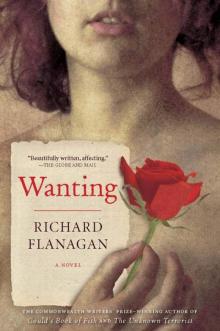 Wanting
Wanting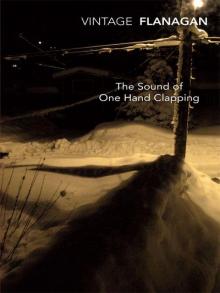 The Sound of One Hand Clapping
The Sound of One Hand Clapping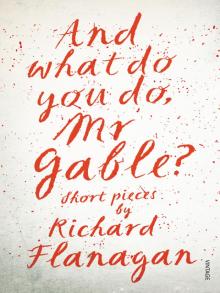 And What Do You Do Mr. Gable?
And What Do You Do Mr. Gable?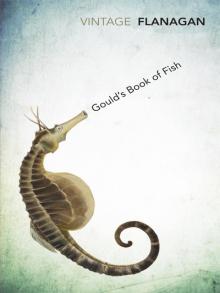 Gould's Book of Fish: A Novel in Twelve Fish
Gould's Book of Fish: A Novel in Twelve Fish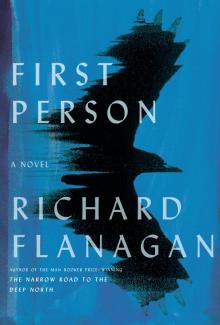 First Person
First Person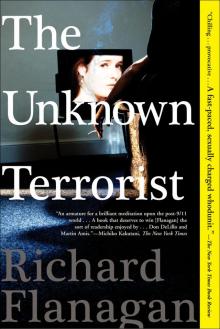 The Unknown Terrorist
The Unknown Terrorist The Narrow Road to the Deep North
The Narrow Road to the Deep North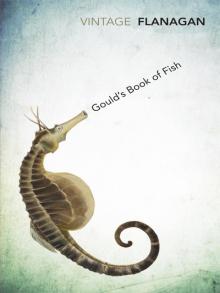 Gould's Book of Fish
Gould's Book of Fish